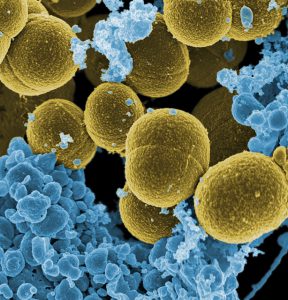Herbicide use contributes to antibiotic resistance in some bacteria
 Photo credit: NIAID
Photo credit: NIAID
A new study published in the scientific journal Microbiology has found that commonly used herbicides can have the unintended consequence of increasing bacterial resistance to antibiotics. Researchers exposed bacteria to commercial formulations of the herbicides 2,4-D, dicamba and glyphosate, and found that upon exposure, the bacteria often became more resistant to antibiotics then they were prior to exposure. The researchers explain that because some herbicides are somewhat toxic to bacteria, exposure to them can induce defenses that allow the bacteria to remove toxins from their cells. Once this defense mechanism is triggered, the bacteria can then use it to defend itself from other toxins such as antibiotics. Thus, bacteria that are able to remove antibiotics from their cells must be exposed to higher levels of antibiotics for longer periods of time before the antibiotic is effective.


